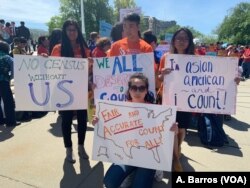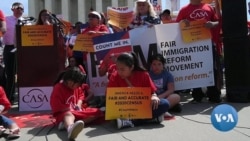The conservative majority on the U.S. Supreme Court appeared sympathetic Tuesday to Trump administration arguments calling for the addition of a citizenship question in the country's 2020 census, despite objections from big states and cities that the query would inhibit immigrants from taking part in the once-a-decade population count.
The five-member bloc of conservative justices holds sway on the nine-person court and seemed dismissive during an 80-minute hearing of contentions that the citizenship question could lead to 6.5 million people — many of them Hispanic immigrants — refusing to take part in next April's survey.
The court's newest member, Justice Brett Kavanaugh, an appointee of President Donald Trump, suggested that Congress could change the law to block the citizenship question if it felt that the query would affect the accuracy of the census. Chief Justice John Roberts said that citizenship information is critical in enforcing the country's voting rights law, the contention offered by the Trump administration as the reason to add the question to the census form for the first time since 1950.
Liberal Justice Sonia Sotomayor pressed government attorney Noel Francisco about why, after "65 off years," the citizenship question was being asked of all recipients after being left out of the Census for so long. Sotomayor added that she had "no doubt" that some immigrant families would respond less.
Reaching as accurate a total as possible in the census is important in the United States because it determines how many lawmakers each of the 50 states has in the 435-member House of Representatives for the next 10 years and each state's share of more than $675 billion in federal funding for an array of government programs.
Three lower federal courts have blocked Commerce Secretary Wilbur Ross, who oversees the census, from adding the citizenship question, finding that millions of non-citizens, often Hispanics, might avoid the census-takers for fear of running afoul of immigration authorities. Trump critics contend the citizenship question is an attempt to try to diminish the number of Democratic lawmakers in the House, where Democrats took control in January.
The case against the citizenship question was brought by New York state and other jurisdictions where large numbers of immigrants live.
Outside the courtroom
New York Attorney General Letitia James said after the hearing that the citizenship question "will undermine the count. We must get the census right."
For the majority of the people filling out the once-a-decade census, the answer to such a question would be easy: They are Americans by birth or naturalized citizens after arriving from other countries.
But Trump, who has embraced a tough stance against illegal immigration and pushed for construction of a wall on the southern border with Mexico to thwart the surge of migrants, also wants to include the citizenship question in an attempt to count the number of undocumented migrants in the country. He said earlier this month a census without a citizenship question would be "meaningless."
The precise figure is not known, but demographers say it could total about 11 million of the 328 million people in the United States.
Wennie Chin from New York, who works with New York Immigration Coalition, said as the daughter of Chinese immigrants she understands why families are reluctant to give out information.
Chin was outside the Supreme Court with a group of demonstrators. People were holding signs saying "I'm Asian American and I count," "No Census without us," and "America needs a fair and accurate 2020 Census."
"I am a child of two very, very hard-working Chinese immigrants, who quite frankly, have never fill out the census before. Ever. … But just the fear of having someone knock on your door, when you are a mix family, you don't want to share information that will put your family members at risk. And we totally understand that," Chin told VOA.
WATCH: US Census
For newly arrived immigrant, Roberto Sanchez, being part of the demonstration motivated him to do exactly what he used to do in his home country: fight for people's rights.
"It motivates me a lot because I know that people are here fighting. And I feel part of it. … So I am happy. I've always liked fighting for human rights," Sanchez said.
With the support from CASA de Maryland, an immigrant rights organization, Sanchez has applied for asylum and his process is ongoing.
He said he left his home country under threats as he was also a human rights activist.
"In my country, I have always been a fighter. Therefore, there was always someone who didn't like it what I was fighting for. So, I ended up in a dangerous situation. … I know what I'm doing [in front of the Supreme Court] is the right thing and everyone will benefit from it," he told VOA.
Census experts
Despite Secretary Ross' decision to add the question to the survey, Census Bureau experts concluded that excluding the citizenship question would produce a more accurate figure for the U.S. population because undocumented immigrants might be reluctant to admit they are not U.S. citizens and refuse to answer the questions.
The Census Bureau estimated that 6.5 million people would avoid answering the questions if the citizenship query were to be included.
The Trump administration says it has wide discretion in designing the questionnaire and notes that the citizenship question has been asked on smaller annual population surveys. It says the question is needed to aid in the enforcement of the federal Voting Rights Act.
Some of the largest states and cities and rights groups are arguing against inclusion of the question, fearing an undercount in the census would hurt their interests, either by cutting their congressional representation in as many as six states through the 2020s or in federal funding.
The Nielsen television ratings company said Monday it also opposes inclusion of the citizenship question, saying an undercount of the U.S. population would adversely affect the U.S. media industry and other businesses that depend on accurate readings of consumer sentiment. Nielsen said its measurements of business trends could be inaccurate for a decade with the question added to the census.
The justices did not ask many questions on the constitutional issue, and focused more on how reasonable the secretary's move was under the Administrative Procedure Act.
After Tuesday's hearing, the Supreme Court is expected to reach a decision by the end of June. The Census Bureau says it that month is also its deadline for formulating the census questionnaire in order to have it ready for the count that will begin in April 2020.









